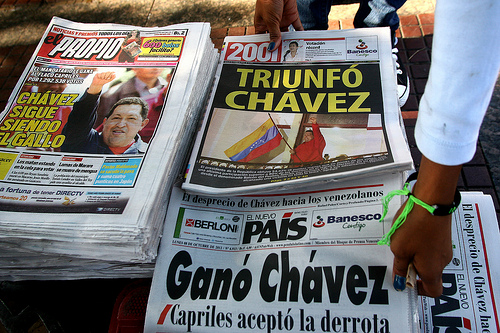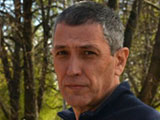The Perfect Victory
by Israel Centeno / October 23, 2012 / 1 Comment
Electoral Strategy in the Petrostate

Venezuelan newspapers announcing Chávez's victory. Photo: Globovisión, Creative Commons.
Since Sunday, October 7, numerous analysts, preoccupied with the Venezuelan elections, have dissected the electoral process to find Capriles’s mistake. I’m going to go in the other direction, although I don’t have much space in which to talk about the facts in depth.

- From his lonely watch post Albert Camus asked who among us has not experienced exile yet still managed to preserve a spark of fire in their soul. “We’re all alone,” Natalia Sedova cried in exile on hearing of her husband Leon Trotsky’s affair with Frida Kahlo. In his novel Night Watch, Stephen Koch follows the incestuous love affair of David and Harriet, wealthy siblings watching the world from their solitary exile. Koch’s writing, Camus’s theories, and Trotsky’s affair all come back to exile and lead me to reflect on the human condition. From my own vantage point, my Night Watch, I will reflect on my questions of exile, writing, and the human condition.

- Israel Centeno was born in 1958 in Caracas, Venezuela, and currently lives in Pittsburgh as a Writer-in-Residence with City of Asylum/Pittsburgh. He writes both novels and short stories, and also works as an editor and professor of literature. He has published nine books in Venezuela and three in Spain.
First of all, I’m going to start from the premise that Venezuela is the oldest populist petrostate and perhaps one of the most powerful in the world. That is to say, in an electoral battle, those opposing the government that has hijacked the state must seek to reinvent populism. This is because their electoral promises will always pale in comparison to those made by the group that controls the country’s basic industry, treasury, and taxes.
Hugo Chávez has developed the perfect strategy. Throughout his years of government, he has implemented dozens of “popular missions” whose aim is to empower the people and make poverty bearable, giving them hope for the future. Those involved in these missions are directly monitored by the incumbent party’s patrols. In 2011, Chávez launched, among other programs, the “housing mission.” Three and a half million families were involved in this project, amounting to 10 million or more potential voters. But the government only provided 300,000 homes, with a considerable display of propaganda. Television programs were interrupted every three or four minutes on both private and state-owned channels in order to emphasize the hopes of the poor. The adverts showed fully-equipped houses, keys, and a voice that declared: “After God comes Chávez.”
What went on during the electoral campaign? Chávez traveled around the country a little in a red Carnival Queen float, calm, talking about his upcoming perfect victory, promising ten more voters for each of his party’s activists. In contrast, Capriles summoned countless people to his rallies, holding one at one end of the country in the morning and another at the other end in the afternoon. Meanwhile, the electoral body allowed the man in the float to have ads on 58 radio and television channels, with an average duration of one to three hours, in which he made promises and threats of civil war, divested those who thought differently about their Venezuelan citizenship, declared himself the heart of the community and the liberator, and even dared to say that poverty, poor public services, and insecurity didn’t matter, because what was most important was Venezuela, and he was Venezuela.
Then election day came. At five in the morning, the military reveille sounded throughout all of Venezuela’s districts. The first official vehicles and trucks appeared, the so-called patrols, the squadrons of motorcyclists, herding the first contingent of voters, military-style. Let’s not forget that every voter had to provide their digital fingerprint via a fingerprint reader. This information was cross-referenced with the patrols’ information until midday, when the patrols initiated the second phase of the strategy: Finding everyone in the projects who had not yet gone to the polls. If we combine the threat hanging over nearly 2 million public workers, the wealthy people who consider Chávez someone to do business with, and the pre-war climate, we are starting to square the circle.
Granted, there are many aspects not covered in this analysis; it is merely an outline of the perfection of the electoral process in Venezuela and the nature of Hugo Chávez’s “perfect democracy.”
Translation: Kelly V. Harrison





One Comment on "The Perfect Victory"
the centeno article on the recent election is deeply misleading, especially beacuse the author speaks as a Venezuelan., making a claim of”asylum”. I have many friends and former stduents in Venezuela, some of whom support Chavez, some of whom don’t, but none has made the claim of intelllectual or poltical persecution. Even the opposition candidate, Capriles, recognized the legitimacy of the election. Chavez does have a lot of pertro-money, the point is the way he choses to use it pleases a majority of the voters .